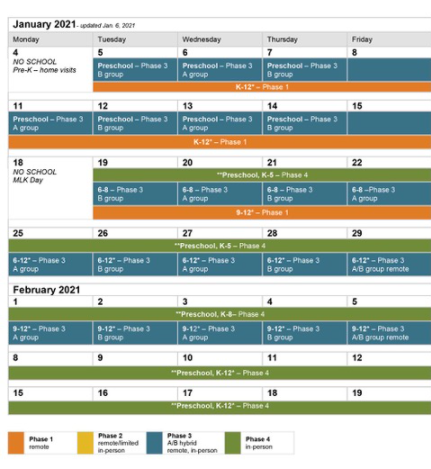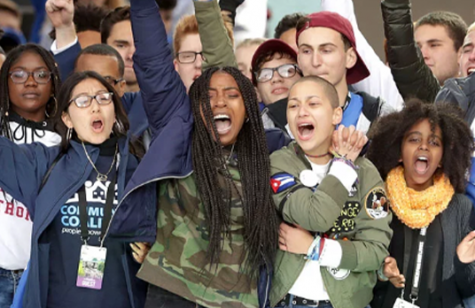Super Tuesday changes course of the upcoming election
Fourteen states turned in their ballots on Tuesday, including Alabama, Arkansas, California, Colorado, Maine, Massachusetts, Minnesota, North Carolina, Oklahoma, Tennessee, Texas, Utah, Vermont, and Virginia.
Tuesday, March 3—better known as Super Tuesday—marked one of the most important landmarks in the 2020 election and one of the biggest turning points thus far. Primary elections throughout the United States were kicked into gear in early February with the Iowa caucuses and have continued for the past month. The primaries have been narrowing down the Democratic candidate pool and contributing to the eventual decision of who will run against Donald Trump in the main race.
Super Tuesday is a concept that originated around the 1980s and was created to describe the day in the race when the most primary elections occurred. Fourteen states voted on Tuesday, including Alabama, Arkansas, California, Colorado, Maine, Massachusetts, Minnesota, North Carolina, Oklahoma, Tennessee, Texas, Utah, Vermont, and Virginia.
Super Tuesday is one of the most important days in the earlier parts of the election, as it can alter the former course of the election and it provides a much better idea of who the eventual Democratic nominee will be. Four of the primaries on Super Tuesday take place in swing states, so it is usually very important in showing the candidates who will pull ahead in the election and the candidates whose campaigns are not doing as well as they might have hoped.
But what does Super Tuesday really mean for the election? Simply put, Super Tuesday will help designate how many delegates a candidate will be allotted in the election. Which candidate will go on to run against Trump is decided by who is able to win the majority of votes from the almost four-thousand delegates. How many delegates each state gets is decided by their population and weight in the Democratic party: meaning how Democratic or Republican-leaning a state is. Super Tuesday will give a good idea of which candidate or candidates 1,344 of those delegates will be voting for.
So, with almost all of the votes counted in the fourteen states, the results are conclusive. Joe Biden has taken a commanding lead in ten of the states, winning Alabama, Arkansas, Maine, Massachusetts, Minnesota, North Carolina, Oklahoma, Tennessee, Texas, and Virginia. Bernie Sanders won states like Vermont, Utah, Colorado, and California.
To anyone who has been actively following the race, these results came as a huge shock. Biden’s campaign had not been doing well and it was almost suspected that he would be dropping out of the race soon, but after a big win in South Carolina, he has been gaining momentum quickly. This was just proven again in the Super Tuesday primaries, as his resounding wins over Sanders in most states continue to boost his campaign further and further.
For Sanders, the news of only winning four states is not looking as good. Sanders has been polling ahead in most states so far, but his losses on Super Tuesday are putting him at a disadvantage going forward. Despite only winning four states, his success in California is a huge accomplishment. California has 415 delegates—the most of any state that voted on Super Tuesday—and therefore has the most influence in the upcoming election. The large number of delegates in California will help to boost Sanders’ polls, but Biden’s huge win will definitely change the trajectory of the election from here on out.
As primary elections continue, the only two candidates left in the race are Biden and Sanders. Since the initial writing of this article, Elizabeth Warren and Mike Bloomberg both dropped out. After Pete Buttigieg and Amy Klobuchar both dropped out of the race the week before, the candidate pool is becoming slimmer and slimmer. Warren and Bloomberg both polled an average around 10-20% of the votes in each state, but their results were not enough to promise a future in the campaign, so both candidates exited the race after Super Tuesday. Bloomberg, Klobuchar, and Buttigieg all endorsed Biden going forward, while Warren has not announced which candidate she will endorse yet.
Super Tuesday is still an early milestone in the election, but its significance in deciding which candidate or candidates will begin to pull ahead is undeniable. With Sanders and Biden consistently winning in the primaries, it is now down to a fight between the two nominees for who will go against Trump in the future, though whoever will win is not set in stone as of yet. The last primary elections will take place at the beginning of June, and the official results of the election are anything but permanent at this point. Voting in elections like the Super Tuesday primaries is the only thing that will make the results clear in the future.
Your donation will support the student journalists of Fossil Ridge High School. Your contribution will allow us to purchase equipment and cover our annual website hosting costs.

Melissa May, a senior, is ecstatic to be starting her fourth year as an Etched in Stone staff member. She is excited to be back writing for the newspaper and is optimistic heading into the semester despite the unusual circumstances. She is thrilled to take on the role of Editor in Chief alongside Caroline...













